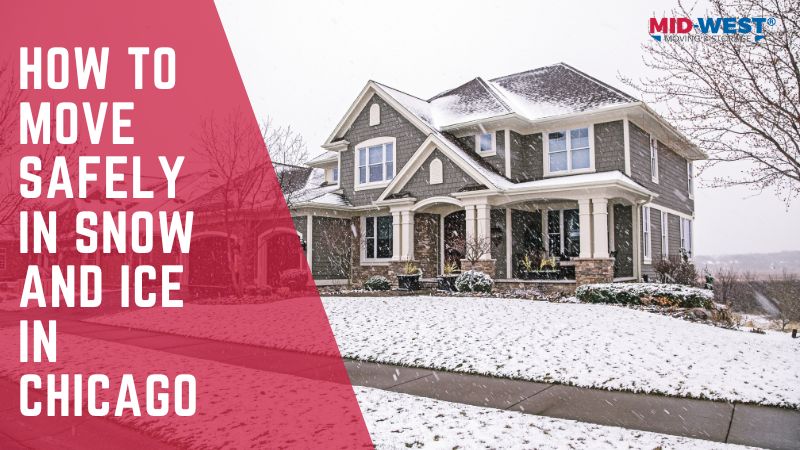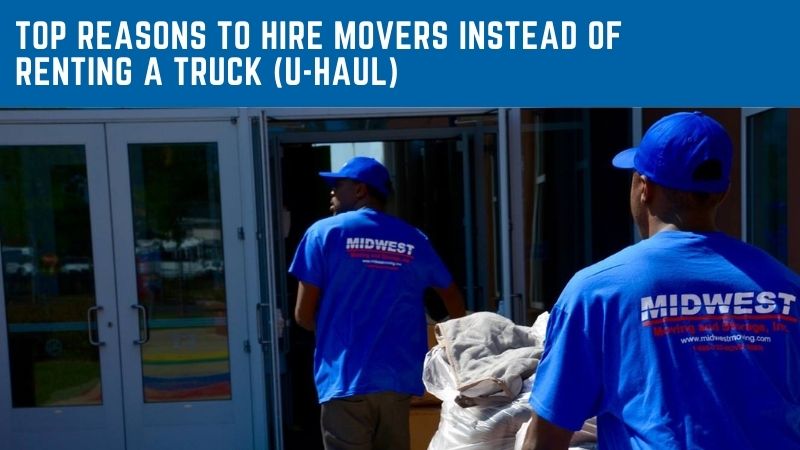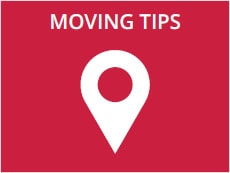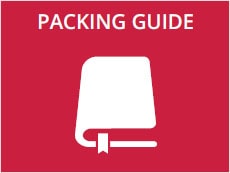Last Updated on January 15, 2026 by Kari-Ann Ryan
DIY Moving or Hiring Professional Movers?
One of the first decisions you’ll face when planning a move is whether to handle it yourself or hire professional movers. Both options come with their pros and cons, and the right choice depends on your budget, timeline, and how much effort you’re willing to invest.
DIY Moving
Tackling the move yourself can save money upfront, especially if you have a small household or just a few items to transport. However, it requires careful planning, packing, and a reliable vehicle. You’ll also need to account for the physical strain and time commitment as moving heavy furniture and making multiple trips can be exhausting.
The average cost of renting a moving truck per day for a DIY move in Chicago is between $19 and $29 and $1.09 per mile for a 10-15 foot truck, $29 and $39 and $1.09 per mile for a 17-20 foot truck, and $39 and $49 and $1.09 per mile for a 20-26 foot truck.
Hiring Professional Movers
Professional moving companies take much of the stress off your shoulders. They handle packing, loading, transportation, and sometimes even unpacking, making the process faster and less physically demanding. Of course, this convenience comes at a cost, and prices can vary based on the distance, size of your move, and additional services like packing or storage.
Ultimately, the decision comes down to balancing cost, convenience, and peace of mind. If your budget allows and you want a smoother, less stressful experience, professional movers are often worth the investment. On the other hand, if you’re up for a hands-on challenge and want to save money, a DIY move could be the way to go.
Cost of Residential Moving Services in Chicago
Understanding the cost of residential moving services in Chicago is crucial for effective budgeting. Moving expenses can vary based on factors like home size, distance, and additional services required. Here’s a detailed breakdown to help you plan:
Local Moves (Within 50 Miles)
For local moves within the Chicago metropolitan area, costs typically range from $139-$259 per hour, with the total cost averaging between $470 and $5,250, depending on the size of your home and the complexity of the move. Here’s an estimated cost breakdown:
| Home Size | Average Total Cost | Number of Movers | Estimated Duration |
|---|---|---|---|
| Studio / 1-Bedroom | $470 – $1,020 | 2 | 3–5 hours |
| 2-Bedroom | $1,220 – $1,670 | 3 | 6–8 hours |
| 3-Bedroom | $1,850 – $2,480 | 3 | 9–12 hours |
| 4-Bedroom | $3,125 – $5,250 | 4 | 12+ hours |
Note: These estimates are approximate and based on hourly rates of $139 for studio and one bedroom, $199 for two and three bedrooms, and $259 for four or more bedrooms, and may vary depending on the moving company and specific circumstances.
For a detailed look at how long a local move in Chicago typically takes, check out this blog post from Mid-West Moving & Storage.
Long-Distance Moves (Over 50 Miles)
For long-distance moves, costs are influenced by factors such as distance, weight of belongings, and additional services like packing or temporary storage. On average, long-distance moves from Chicago can range from $2,000 to $20,000 or more, depending on the destination and specifics of the move.
Note: It’s advisable to obtain quotes from multiple moving companies to get an accurate estimate tailored to your specific needs.
Additional Costs to Consider
- Packing Services: Professional packing services can add $25–$50 per hour, depending on the volume and complexity of items.
- Furniture Disassembly/Assembly: Some companies charge $50–$150 for disassembling and reassembling furniture.
- Elevator or Stairs Fees: If your move involves navigating stairs or using an elevator, additional fees may apply.
- Insurance: Basic liability coverage is often included, but full-value protection may come at an additional cost.
Note: Always inquire about potential extra charges when obtaining quotes to avoid unexpected expenses.
Cost of Office Moving Services in Chicago
Relocating your business in Chicago involves more than just moving desks and computers, it requires careful planning and budgeting. Office moving costs can vary widely based on factors like office size, distance, and the complexity of the move. Here’s a breakdown to help you estimate expenses:
Small Office
- Estimated Cost: $750 – $1,275
- Hourly Rate: $139 for two movers
- Duration: 5-8 hours
- Details: Ideal for solo entrepreneurs or small teams, this range covers the basics: packing, transportation, and minimal setup. It’s suitable for small offices or home-based businesses transitioning to a commercial space.
Medium Office
- Estimated Cost: $1,680 – $2,160
- Hourly Rate: $199 for three movers
- Duration: 8-10 hours
- Details: For growing businesses, this budget accommodates additional services like IT setup, furniture disassembly/reassembly, and temporary storage. It’s designed for offices with moderate equipment and furniture needs.
Large Office
- Estimated Cost: $2,640 – $4,250
- Hourly Rate: $259 for four movers
- Duration: 10-14 hours
- Details: Large-scale moves require comprehensive planning, including specialized equipment handling, coordination of multiple departments, and potential downtime minimization. This range is typical for corporate headquarters or multi-floor relocations.
Factors Influencing Office Move Costs
- Building Accessibility: High-rise offices or buildings without elevators may incur additional charges for stair carries.
- Special Equipment: Moving sensitive equipment like servers or medical devices requires specialized handling.
- Downtime Minimization: Moves scheduled during off-hours or weekends may involve premium pricing.
- Packing Services: Full-service packing can add to the cost but reduces employee downtime.
- Storage Needs: Temporary storage solutions may be necessary if the new space isn’t ready upon departure.
For a more tailored estimate, it’s advisable to consult with local commercial moving companies. They can assess your specific requirements and provide a detailed quote.
Estimate Your Costs: To get a clearer idea of what your move might cost, you can use our moving cost calculator. By entering details like your home size, moving distance, and services needed, it provides a personalized estimate so you can budget more effectively and avoid surprises.
Factors that Affect Moving Costs in Chicago
Understanding the variables that influence moving expenses can help you plan a more cost-effective relocation. Several factors can impact the total cost of your move in Chicago:
Distance of the Move
- Local Moves: Typically, moving within the Chicago metropolitan area is more affordable due to shorter travel distances.
- Long-Distance Moves: Relocating to or from Chicago, especially over 100 miles, can significantly increase costs. These moves often involve additional charges based on mileage, weight of belongings, and time spent.
Size and Volume of Belongings
- Home Size: Larger homes with more rooms require more time, labor, and equipment, leading to higher costs.
- Volume of Items: The more items you have, the bigger the truck and the higher the cost.
Time of Year and Timing
- Peak Season (May–September): Moving during these months can increase prices by 20–30% due to higher demand.
- Off-Peak Season (October–April): Rates are generally lower during these months, but weather conditions can pose challenges.
- Weekdays vs. Weekends: Weekends tend to be more expensive due to higher demand. Moving on a weekday can often be less expensive and provide more openings and convenience in timing.
- Start and End of the Month: Many leases end at these times, increasing demand and costs. Mid-month moves can be more affordable.
Additional Services
- Packing and Unpacking: Hiring professionals for packing can add to the cost but may reduce the time and effort required.
- Storage: If your new home isn’t ready, temporary storage services can incur additional fees.
- Specialty Items: Moving pianos, artwork, or other valuable items may require specialized handling, leading to extra charges.
Accessibility
- Stairs and Elevators: Navigating stairs or using elevators can increase labor time and costs.
- Parking: Limited parking or the need for permits can add to expenses.
Type of Move
- Residential vs. Commercial: Office moves often require specialized equipment and trained professionals, potentially increasing costs.
- DIY vs. Professional Movers: Handling the move yourself can save money but may involve hidden costs like vehicle rental and time.
How to Reduce Moving Costs in Chicago
Moving can be expensive, but there are several strategies to keep your Chicago move more budget-friendly without sacrificing quality or safety.
- Plan Ahead
Booking your movers well in advance can help you secure better rates and avoid last-minute fees. Early planning also gives you time to sort through your belongings and reduce the amount you need to move.
- Declutter Before You Move
The less you have to move, the lower your costs. Donate, sell, or recycle items you no longer need. Fewer items mean smaller trucks, fewer labor hours, and lower packing costs.
- Compare Quotes from Multiple Movers
Get estimates from several licensed and insured moving companies. Comparing prices ensures you get competitive rates and can help you find companies that offer discounts or promotions.
- Move During Off-Peak Times
Rates are typically higher during summer months, weekends, and at the start or end of the month. If possible, schedule your move during weekdays, mid-month, or the off-season (fall and winter) to save money.
- Handle Some Tasks Yourself
You can save by packing boxes, disassembling furniture, or transporting small items yourself. Even partial DIY efforts can reduce labor hours billed by movers.
- Use Free or Discounted Packing Supplies
Collect boxes from grocery stores, liquor shops, or online marketplaces instead of buying new ones. Bubble wrap alternatives like towels and linens can protect fragile items at no extra cost.
- Take Advantage of Discounts
Many moving companies offer military, student, or senior discounts. Ask about any available promotions or bundled services that could lower your total cost.
By planning strategically and exploring cost-saving options, you can significantly reduce your moving expenses while ensuring a smooth relocation in Chicago.
Complete Your Move to Chicago with Mid-West Moving & Storage
Moving in Chicago and the nearby suburbs doesn’t have to be overwhelming or expensive. From Evanston, Oak Brook, Schaumburg, Naperville, and Arlington Heights to all areas across the greater Chicagoland region, Mid-West Moving & Storage offers reliable moving services for homes and offices of any size.
Whether you’re relocating a small apartment, a large home, or an entire office, professional movers can take the stress out of the process. Mid-West Moving & Storage offers experienced, reliable moving services tailored to your needs, ensuring your belongings arrive safely and on time. Don’t leave your move to chance, contact Mid-West Moving & Storage today to get a personalized quote and make your next move the easiest one yet.
Frequently Asked Questions
When is the best time to schedule a move in Chicago?
Peak moving season in Chicago is typically from May through September, when demand is highest and rates can increase 20–30%. Off-peak months (October–April) often have lower rates, but weather may pose challenges like snow or ice. Mid-month and weekday moves can also help reduce costs.
Do I need permits for moving in Chicago?
If your move involves street parking for moving trucks, especially in downtown or congested neighborhoods, a permit may be required. Check local municipal rules or ask your moving company to handle permits if needed.
How much should I budget for unexpected moving expenses?
It’s wise to set aside an extra 10–15% of your moving budget for unplanned costs such as additional packing materials, last-minute storage, or extended labor hours.

Director of Marketing & Development
Kari-Ann Ryan is a dynamic marketing strategist with a proven track record in brand development, corporate visibility, and business growth. As the Director of Marketing & Development for Mid-West Moving & Storage and Chicago Office Movers, she leads all branding, marketing, and business development initiatives, driving awareness and engagement across multiple industries.
With extensive experience in multi-brand marketing, nonprofit fundraising, event planning, and retail management, Kari-Ann brings a comprehensive and results-driven approach to her role. She is a dedicated leader in the business community, actively involved in the Schaumburg Business Association and the GOA Regional Business Association. She also serves as a Board Member for the Alzheimer’s Association Illinois Chapter, reinforcing her commitment to advocacy and philanthropy.
In addition to her corporate role, Kari-Ann is the founder of LMJ’s Lost Souls – Alzheimer’s Fund, a nonprofit organization dedicated to awareness, education, and fundraising for Alzheimer’s research and support.
She holds a Bachelor of Business Administration in Marketing from Western Michigan University and is Certified in Constant Contact Email Marketing, with expertise in social media strategy and digital engagement.












